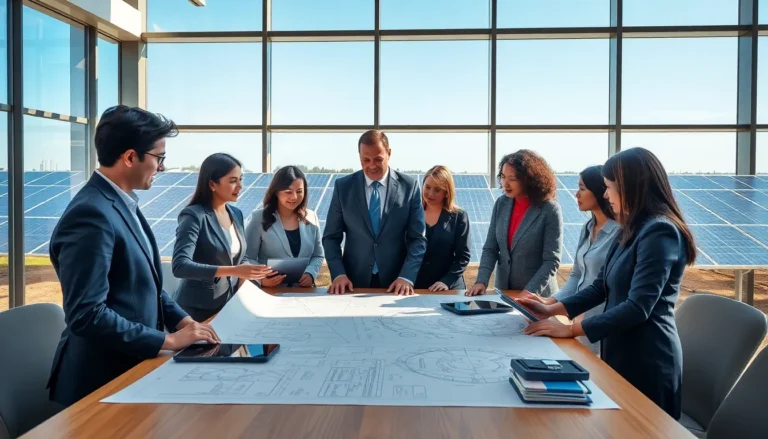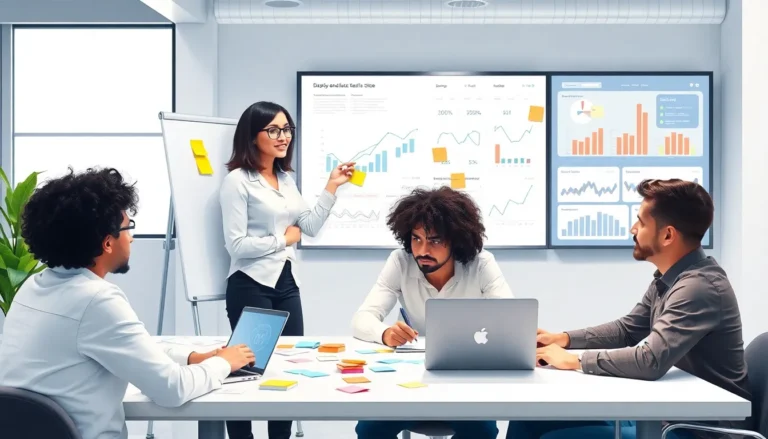Table of Contents
ToggleImagine a world where flying cars zip through the skies and robots handle all your chores—sounds like a sci-fi movie, right? But what if these futuristic fantasies are just a century away? As technology races ahead and societal norms shift, the next 100 years promise to be a wild ride filled with innovations that could make today’s conveniences look like cave paintings.
Overview of Future Predictions
Innovations expected in the next century promise significant enhancements to daily life. Emerging technologies could lead to the widespread use of flying cars, transforming urban mobility and reducing traffic congestion. Autonomous robots may handle household chores and personal tasks, allowing people to focus on more creative pursuits.
Virtual reality and augmented reality environments may fully integrate into education, offering immersive learning experiences. Smart cities might arise, featuring interconnected systems that optimize energy efficiency and improve air quality. In healthcare, advancements in telemedicine and artificial intelligence could revolutionize patient care, enabling personalized treatments based on genetic data.
Climate change solutions may gain traction, leading to renewable energy sources dominating the power grid. Urban agriculture could flourish, minimizing food transportation emissions and providing fresh produce to city dwellers. Innovations in materials science might produce self-healing infrastructure, enhancing the longevity of roads and bridges.
Human interaction with technology is likely to evolve, with brain-computer interfaces enabling direct communication between minds and machines. Moreover, societal structures could shift, emphasizing work-life balance and universal basic income as automation reduces the need for traditional jobs.
Global collaboration may become essential, addressing challenges like climate change and inequality through unified efforts. As predictions unfold, the future is poised to be a remarkable blend of advancements that reshape daily experiences.
Technological Advancements
Technological advancements in the next century are poised to reshape lives in unprecedented ways. Innovations will likely enhance convenience and efficiency across various fields.
Artificial Intelligence and Automation
Artificial intelligence will redefine work. AI systems could handle tedious tasks, allowing humans to engage in more creative endeavors. Automation is expected to increase productivity in industries like manufacturing and healthcare. Robots might take over routine jobs, leading to less manual labor. As AI becomes more sophisticated, personalized experiences in education and entertainment will likely emerge. Increased reliance on automation could result in significant economic shifts, emphasizing the need for reskilling and adaptability in the workforce.
Future of Transportation
The future of transportation promises groundbreaking changes. Flying cars may become a common sight, fundamentally altering urban landscapes. Enhanced public transit systems using electric and autonomous vehicles could reduce congestion and lower emissions. Hyperloop technology might facilitate rapid travel between cities, cutting journey times dramatically. Innovations in personal transportation will likely make travel safer and more efficient. Car-sharing programs may gain popularity, promoting sustainable mobility solutions. Investments in smart infrastructure will optimize traffic flow and provide real-time data to users.
Environmental Changes
Future environmental changes reflect critical shifts driven by technology and societal adaptation. Anticipating these developments showcases humanity’s response to ongoing challenges.
Climate Change Impact
Climate change’s impact may manifest in pronounced weather patterns and rising sea levels. Extreme weather events are likely to become more frequent, unleashing destructive storms and prolonged droughts. Coastal cities could face increased flooding, prompting the necessity for adaptive infrastructure. Biodiversity loss may escalate, affecting various ecosystems and food supply chains. With an emphasis on climate resilience, communities will focus on sustainable development practices. Agricultural landscapes could transform to incorporate drought-resistant crops. Urban areas may see enhanced green spaces, improving air quality and residents’ well-being. Innovations in climate monitoring will aid proactive measures, ensuring societies can respond effectively.
Renewable Energy Innovations
Renewable energy innovations are set to dominate future energy landscapes. Solar and wind power capacities will significantly expand, offering cleaner alternatives to fossil fuels. Storage technologies for energy will improve, enabling efficient distribution during peak demand. Smart grids will play a pivotal role, integrating numerous energy sources and optimizing consumption. Electric vehicles may become the norm, reducing reliance on gas-powered transportation. Hydrogen fuel cells could also emerge as a vital energy solution, supplying power for various applications. Collaborations among governments and private sectors will drive investment in sustainable energy projects. Advances in energy efficiency will promote lower consumption while maintaining quality of life.
Societal Transformations
Societal transformations in the next century will redefine daily interactions and structures. Innovations in technology will significantly alter how people work and learn.
Changes in Work Dynamics
Automation will play a critical role in reshaping job landscapes. Many individuals may shift from traditional employment to more creative and strategic roles as artificial intelligence handles repetitive tasks. Remote collaboration could become standard, allowing teams to work together from various locations. Flexible work arrangements might emphasize results over hours worked, fostering better work-life balance. Companies may adopt more inclusive hiring practices, focusing on diverse talent and skills rather than conventional credentials.
Evolution of Education
Education will undergo radical changes as technology augments traditional learning methods. Virtual classrooms may provide personalized instruction tailored to individual needs. Interactive simulations could enhance practical learning experiences, enabling students to engage with subjects like never before. Lifelong learning will likely become essential as industries evolve, promoting continuous skill acquisition. Moreover, globally accessible educational resources will bridge gaps, allowing underserved communities to participate in the knowledge economy.
Health and Medicine
Health and medicine are poised for transformative advancements over the next century. Innovations in biotechnology may reshape the medical landscape dramatically.
Advances in Biotechnology
Biotechnology is likely to revolutionize treatment methodologies, with gene editing technologies like CRISPR allowing for precise corrections of genetic disorders. Personalized medicine may deliver tailored therapies based on individual genetic profiles. Immunotherapy could become the norm, training the immune system to target cancerous cells effectively. Regenerative medicine might enable the growth of new tissues and organs, alleviating shortages for transplants. Wearable health monitoring devices will offer real-time health data, empowering individuals to manage their conditions proactively.
Aging Population and Healthcare
The aging population presents unique challenges for healthcare systems. By 2100, nearly 2 billion people will be over 65, necessitating advanced healthcare solutions. Telemedicine could provide accessible care to remote areas, improving health outcomes. Chronic diseases may see better management through continuous monitoring and artificial intelligence, predicting complications before they become critical. Community-based care could emerge as a favorite model, fostering greater engagement between patients and providers. Enhanced training for healthcare professionals will ensure they are well-prepared to meet the complex needs of older adults.
The future holds incredible potential for transformation across various aspects of life. With advancements in technology and a focus on sustainability, society is likely to witness unprecedented changes that enhance daily experiences. Innovations in transportation, healthcare, and education are set to redefine how individuals interact with the world.
As challenges like climate change and an aging population arise, collaboration and adaptability will be key in navigating these complexities. Embracing a future where technology and humanity coexist harmoniously will pave the way for a more efficient and equitable world. The next century promises to be a remarkable journey filled with possibilities that can reshape the human experience.








